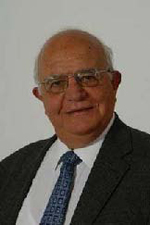By Karen Weintraub
| GLOBE CORRESPONDENT DECEMBER 26, 2011

Dr. Salah D. Salman
WHO
Dr. Salah D. Salman
WHAT
Salman, a former Lebanese cabinet minister and former surgeon at the Massachusetts Eye and Ear Infirmary, recently wrote a critique of the American medical system, ‘‘Scrubbed Out: Reviving the Doctor’s Role in Patient Care.’’
Q. You raise a lot of questions in your book about the quality of the American medical system. Is our system worse than we think it is?
A. There’s no question the US system is an excellent system, however it is not available to a large sector of the population. I also consider health care a human right, which it is not in the US. This is really a scandal in my opinion.
Q. Your basic premise in the book is that the role of doctors has slipped significantly since you were trained.
A. American doctors have been first marginalized and then intimidated by the administrators, so they have not acted responsibly like they should. They kept quiet. Criticism is not welcome at all, even in a hospital of the stature of the Mass. Eye and Ear and a university of the stature of Harvard Medical School.
Q. You think a big part of the problem with medicine today is that it’s viewed as a business rather than a service?
A. The influence of the pharmaceutical industry on research and on teaching is something that should make everybody alarmed. Where is the government? The government is unaware of these problems or has decided to ignore them. The lobby of the wealthy and generous corporations has stood in the way of major reform.
Q. How do you think health care costs should be controlled?
A. Costs cannot be controlled except by the medical profession itself. If I decide to overspend by ordering more tests or operating unnecessarily, nobody can stop me except my peers, and unfortunately, the peers are not there.
Q. How did this emphasis on business affect you when you were practicing, before you retired in 2009?
A. I was criticized when I was working there because I refused to see as many patients as many of my colleagues. I advertised my practice as being a boutique practice, not a supermarket kind of practice. I was making enough money to live comfortably, but I was not driving a Mercedes, I was driving a Honda.
Q. You say that teaching medicine has also fallen from its once high position.
A. I am 75 years old now. When I became a doctor at the age of 25, my father was a doctor; he was an old-timer. Our teachers were teaching by example, not only by lectures, and medicine was better practiced, it was more human. The teachers prided themselves on being teachers. Now, it’s all business.
Q. As a surgeon at Mass. Eye and Ear for 22 years, you were also on the faculty at Harvard Medical School, but you and your peers weren’t paid for your teaching?
A. Harvard does not pay us because they think if we have on our stationary “Harvard,’’ that will attract patients. Harvard’s reputation has been built on the shoulders of doctors who now are penalized for the reputation they helped Harvard acquire. That doesn’t make sense.
Q. Aren’t you, in a sense, violating the unwritten code of medicine not to talk about problems in public?
A. To criticize my profession publicly is not an easy thing to do. They are my friends and my colleagues. We spent hours working hard together. Then I realized, when I saw the number of uninsured increasing, the cost increasing, and nothing serious is being done well my loyalty to my profession and to my patients [is] stronger than my loyalty to whoever was signing my check.
This interview was edited and condensed. Karen Weintraub can be reached at Karen@KarenWeintraub.com .
